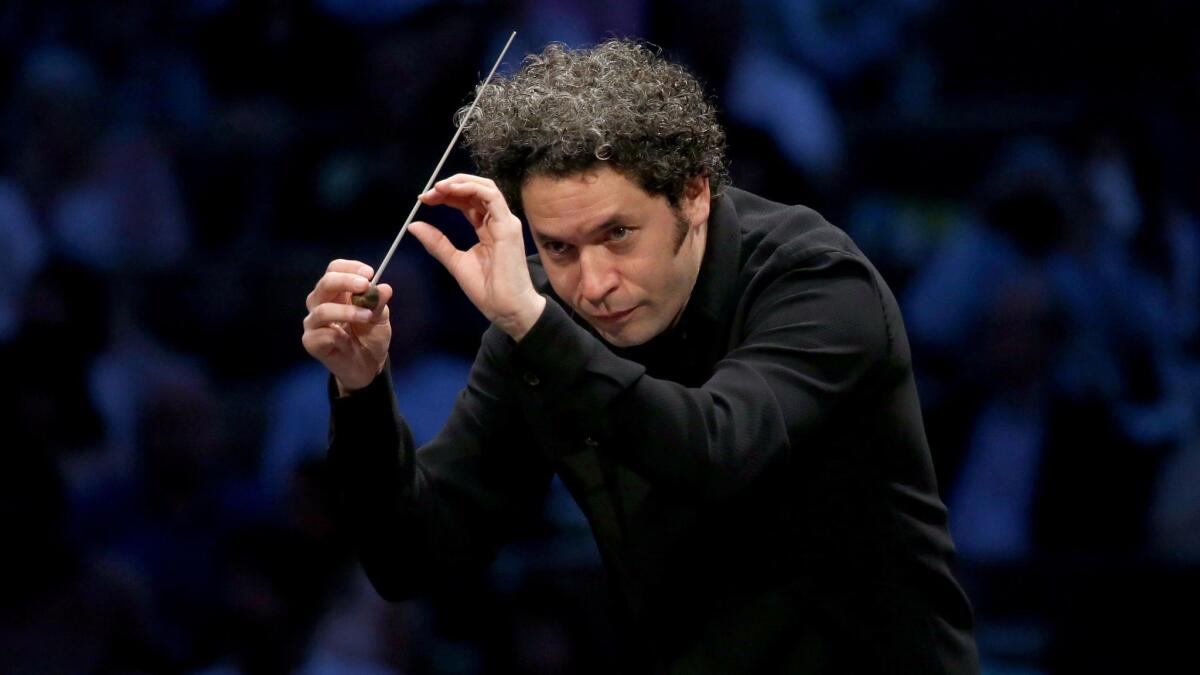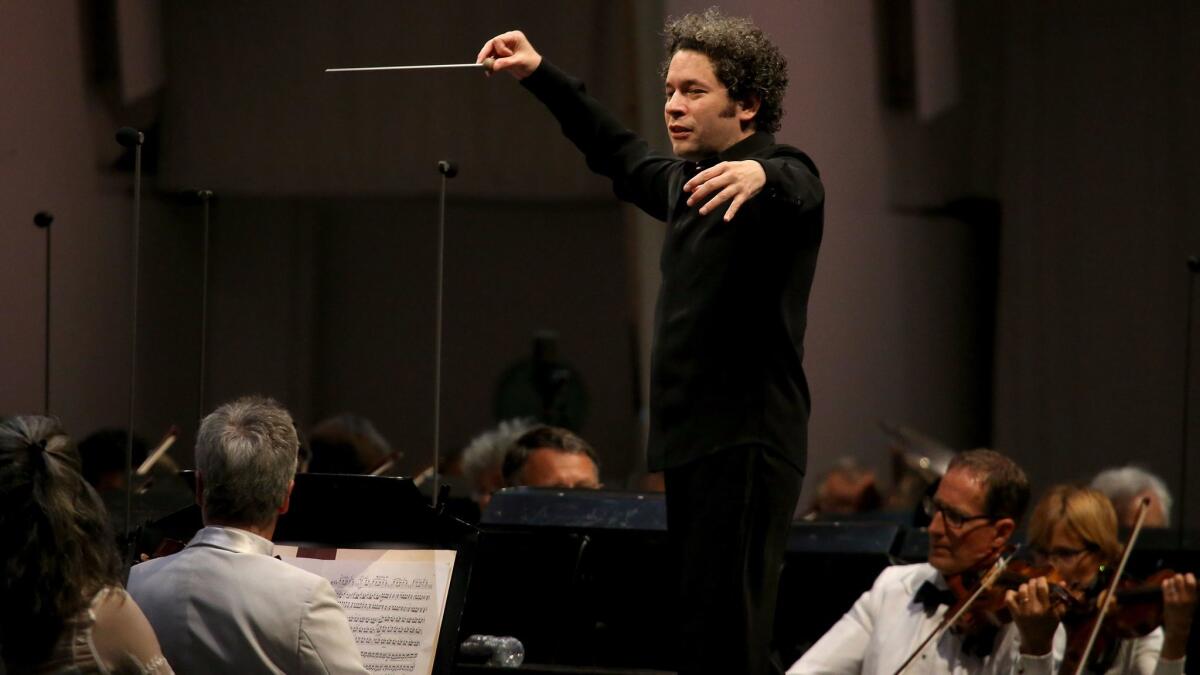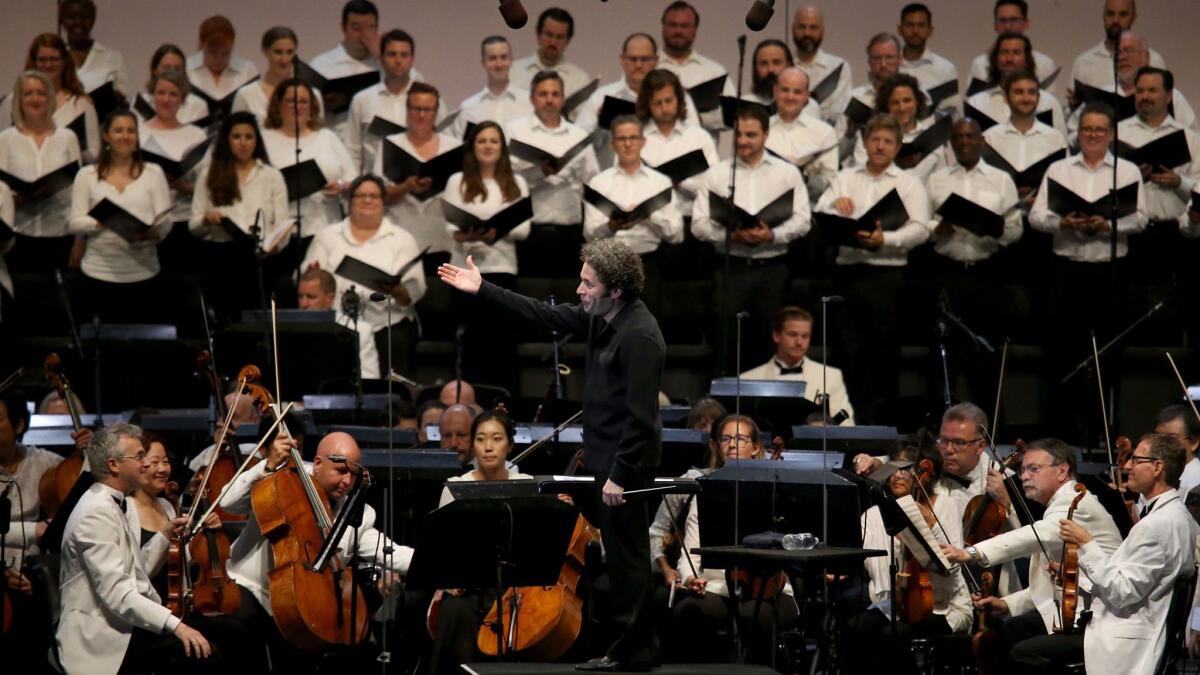Review: The Bowl is no Bayreuth. And with Wagner in Dudamel’s defiant hands, that’s not a bad thing

We know exactly the atmosphere in which Wagner wanted his music performed. Or at least we think we do, and it is not sonically, physically and aesthetically the Hollywood Bowl, where Gustavo Dudamel happened to lead a spectacularly effective all-Wagner concert Thursday night with the Los Angeles Philharmonic and Master Chorale.
Wagner’s wishes (make that demands, we’re talking Wagner, after all) resulted in the opera house he built in Bayreuth, Germany, where he created a summer festival for his operas. The acoustics are stunning and the orchestra plays in a hidden pit, creating a magical musical effect. The audience makes a pilgrimage to get there (planning years in advance to get tickets), dresses formally, sits on hard seats and doesn’t dare move a muscle or make a peep. Despite a sweltering theater without air conditioning, jackets stay on through exceedingly long operas.
You know the routine for the Bowl — informality, picnicking, everything musically and visually in your face, thanks to bold amplification and high-definition video screens. If it’s mystery you’re looking for, try the Magic Castle down the road.

What made the Bowl program captivating came in great part from Dudamel, who has lately been immersing himself in Wagner’s scores.
On top of all the Bowl’s defiance of Wagnerian ambience, Dudamel offered next to nothing in the way of creating the sense of Wagner’s revolutionary music drama. The entire program of short orchestra and choral excerpts from three operas — “Tannhäuser,” “The Flying Dutchman” and “Die Meistersinger” — contained around an hour’s worth of music, less than the length of a typical act in a Wagner opera, and no solo singing.
The fact that Dudamel could make the evening work brilliantly may not entirely discount the authentic character of Bayreuth, but given Wagner’s unpleasant side, such as his appalling anti-Semitism, there is hardly necessity to heed the composer’s many prescriptions thoughtlessly. And among the deviltries of this composer is that remarkable ease with which his music easily survives dismantling in matters of sound or atmosphere without losing (and even sometimes gaining) exceptional power over the listener.
He knew this as well as anyone, regularly conducting or condoning excerpts of his operas in concert performances throughout Europe in order to get the word around.
Given Wagner’s unpleasant side, such as his appalling anti-Semitism, there is hardly necessity to heed the composer’s many prescriptions thoughtlessly.
I recently had new proof that Wagner’s music can survive just about any sonic insult from streaming British comedian Stephen Fry’s lovely BBC film, “Wagner & Me,” over Amazon. The soundtrack was so badly compressed and distorted that the music should have been unlistenable. Yet the scores somehow seemed all the more musically enthralling thanks to Fry’s ability to entice the viewer into making an effort to overcome the distortion. I found that a curious cinematic equivalent of the effort required to endure a performance at Bayreuth.
What made the Bowl program captivating came in great part from Dudamel, who has lately been immersing himself in Wagner’s scores. Thus far the only Wagner opera he has conducted is “Tannhäuser,” which was in Colombia four years ago. But he keeps scores of Wagner’s “Ring” cycle prominently displayed in his office at Walt Disney Concert Hall. On July 1, he conducted the Berlin Philharmonic’s annual summer outdoor park concert in the Waldbühne, devoting much of the program to excerpts from the “Ring.”
The Bowl program was less conventional. For “Tannhäuser” and “Dutchman,” Dudamel began with the overtures and ended with a choral climax from late in the opera, with a little choral something in between. He followed the same format for “Meistersinger” but concentrating only on Act 3 and not playing the famous overture.

Much of this music is simply thrilling. “Tannhäuser” included a dozen brass players standing on the side of the stage, helping herald a joyful celebration of a song contest, with orchestra and chorus exalted. In but a few minutes, we got the range of “Meistersinger,” from the depths of depression in the third act orchestral prelude to the final gloriously celebratory chorus, also of another song context with spiritual connotations.
This all worked surprisingly well in the Bowl. Its latest and greatest sound system is capable of such glory, especially at the dynamic extremes. Amplification of the loudest and punchiest bits had the force to create reverberation throughout the vast amphitheater, producing an epic sense of space that no indoor theater could match. The loudspeakers also highlighted intimate moments, such as the exquisite chamber music interplay between solo violin and clarinet in the “Tannhäuser” overture that might also be lost in the opera house.
Visually, there was Dudamel, on the big screens, always a physical gesture and expression to match every musical one, and the L.A. Phil and Master Chorale brought out an exceptional sense of musical character. No, this wasn’t the equivalent of losing oneself to Wagnerian operatic rapture. The choruses are terrific, but is Wagner Wagner without solo singers? Maybe not. But providing a sense of range of what the operas had to offer anyway was no small accomplishment.
Knock on wood, the L.A. Phil has been unusually successful in its opening weeks at the Bowl in warding off noisy airplanes and especially helicopters. But even Wagner could have taken that, at least when Dudamel decided at the last minute to close the short program with the best known of all Wagnerian excerpts. If any Wagner is indestructible yet still capable of bringing tears to the eyes and joy to the breasts of billions it’s the Bridal Chorus from “Lohengrin” at weddings.
Had a rogue helicopter flown over the Bowl during the “The Ride of Valkyries,” that too, thanks to “Apocalypse Now,” would have probably only added to the excitement.
ALSO
Review: Dudamel and Beethoven — and Vin Scully — for the common man
Critic’s Notebook: At the G-20, Beethoven is played and the world listened (maybe)
Review: L.A. versus Berlin: Which is king of the classical world?
Critic’s Notebook: Evolution, revolution, smevolution: The future of classical music
Critic’s Notebook: Mozart in Trump Tower, and the art of getting political onstage
More to Read
The biggest entertainment stories
Get our big stories about Hollywood, film, television, music, arts, culture and more right in your inbox as soon as they publish.
You may occasionally receive promotional content from the Los Angeles Times.











